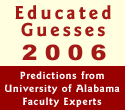 Internet banking will continue to increase as more consumers do their personal banking online in the coming year, a University of Alabama banking expert says. Competition for financial services will also be intense.
Internet banking will continue to increase as more consumers do their personal banking online in the coming year, a University of Alabama banking expert says. Competition for financial services will also be intense.
“Continued changes in electronic and internet banking are inevitable,” says Dr. Benton Gup, professor of finance and holder of the Robert Hunt Cochran/Alabama Bankers Chair at UA. “The boundaries between banks and other financial service providers will blur, and bricks and clicks will complement each other. Thus, banks will require less of a physical presence than they have now, and there is the possibility that the internet and related technologies will bypass many banks.”
A survey done by the Pew Internet Project shows that about 50 percent of older baby boomers and 40 percent of younger baby boomers are banking online. About 60 percent of Generation Y consumers are banking online, and those numbers are expected to increase.
Gup says banks are responding to changes in competition, globalization, laws, technology, and other factors, but the long-run effect of these factors on banks is not clear.
“The competitive environment for financial services has never been more intense than it is today. Non-bank competitors such as brokerage firms, insurance companies, mutual funds and credit unions have gained control of a significant portion of individually owned financial assets in the United States at the expense of the banking industry. There is also increased competition from European banks. Three of the top 11 bank holding companies in the U.S. are foreign owned by Deutsche Bank (Germany), ABN Amro (The Netherlands), and HSBC (United Kingdom),” Gup said.
Gup also pointed out the increased competition from non-bank financial institutions such as Merrill Lynch, Fidelity Funds, and GE Capital. The result is that the bank industry’s share of financial assets and deposits has declined. To counter this trend, some U.S. banks have merged and converged with other types of financial service providers, including securities and insurance firms, and that trend is likely to continue.
“All of these changes pose both challenges and opportunities for community, regional, and large banks,” Gup said, adding that we can look for fewer community banks than exist today and a relatively small number of increasingly larger global banks in the future.
Contact
Office of Media Relations, 205/348-5320Dr. Benton Gup, professor of finance and Robert Hunt Cochran, Alabama Bankers Chairholder, 205/348-8984, bgup@cba.ua.edu